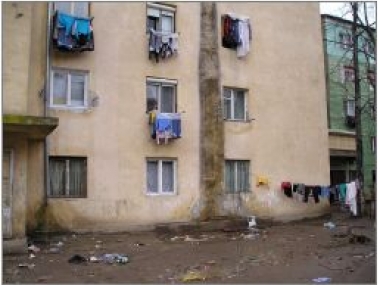Special Report: Alba Iulia, a Laboratory of Urban Renovation for Romania
Edited on
09 October 2017Partner in the URBACT Nodus project, which ended last spring, Alba lulia is an urban area with 100,000 inhabitants located in the centre of Romania. In order to stem rising urban insecurity, the city chose to lead a pilot project in a neighbourhood, carrying out a detailed sociological and statistical study that was followed up with initiatives defined jointly with inhabitants. Nicolaie Moldovan, Community Project Leader in Alba lulia, recounts this innovative experience and the local impact of the Nodus project in a country where urban renovation is still a recent introduction.

Nicolaie Moldovan explains that one of the main problems in Alba lulia is spatial segregation. As in other Romanian cities, post-1990s urban development valorised peri-urban areas, which led progressively to the rise of two extremes, with rich residential areas alongside zones with very insecure living conditions. Yet the city lacked an essential element needed to find solutions to rising pauperisation of certain neighbourhoods: reliable and targeted data about these neighbourhoods.
As part of the URBACT Nodus project, which focused on regional territorial development, Alba lulia decided to make this problem a priority. A disadvantaged neighbourhood was chosen for a pilot initiative. It is located in the northern part of the city and is characterised by massive buildings, often uninhabited, built during the Communist era. Between these buildings, inhabitants have built unauthorized constructions (garages, etc.).
The Local Action Plan created as part of the Nodus project focussed on one building, the G2, which was nicknamed "The Dove". The building was a collection of 105 one-room, 11.5-sq-m flats holding a concentrated Rom community with a large number of children living in extreme poverty. Summary housing conditions combine with unemployment, lack of or informal job security, outstanding debt, and asocial or violent behaviour. The goal of the Local Action Plan was to improve living conditions, hygiene, education, and employment for the inhabitants and their children, along with their relations with local authorities.
"First, the priority was to have an overview of life in this building and to know the perception both inhabitants and surrounding neighbourhoods had of it," explains Nicolaie Modldovan. A sociological survey was carried out by a mixed team made up of experts in urban sociology from the Life Quality Research Institute (Bucharest Romanian Academy) and professional statisticians who worked together to collect concrete indicators and to identify the community’s problems.
What was original about this project was that it got the target groups involved. It was carried out with the inhabitants, not for them. The URBACT Local Support Group gathered elected officials, including the Mayor, a group a eight G2 volunteers, the nearby neighbourhood owners' associations, the local police, representatives of the schools frequented by G2 children, the specialised education centre, the local electricity company ENEL, independent sociologists and Unicef volunteers.
Real Results
After the survey phase, which made it possible to identify the key causes of dissatisfaction—insalubriousness, incivility of certain individuals, etc.—shared rules were defined collectively. Their goal was to promote clear, calm relations using incentives and penalties. They may not have resolved all the problems, but they had a positive impact and enabled, for example, resolution of the problems related to electricity, scheduling cleaning of public areas, the start of renovations, clarifying the legal situation of certain residents, and starting children's activities.
For Nicolaie Moldovan, "the sociological survey was thus able to lead to very concrete projects that are themselves the start of other projects." One is the Foundation Soros Romania, whose goal is to promote the social integration of children at risk by rewarding positive behaviour. The goal is also to promote informal education and support recreational and cultural activities for children.
Nicolaie Moldovan finds Alba lulia's participation in URBACT Nodus project to be very positive. It was, naturally, enriching to discuss with large cities such as Barcelona or Amsterdam, which are more advanced in urban renovation. But above all, it was useful, bringing concrete benefits to the field. Prior to a possible dissemination of the "Alba lulia method" in Romania.
Read more:
- Nodus - URBACT website
 Download NODUS Final Report (8.6 MB) (including Alba Iulia's Local Action Plan) - PDF
Download NODUS Final Report (8.6 MB) (including Alba Iulia's Local Action Plan) - PDF
Submitted by admin on




